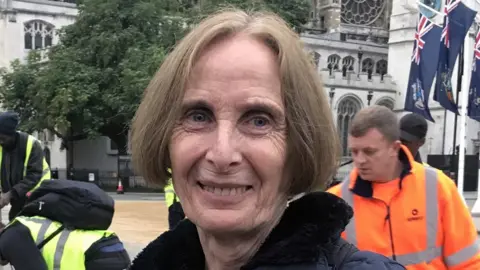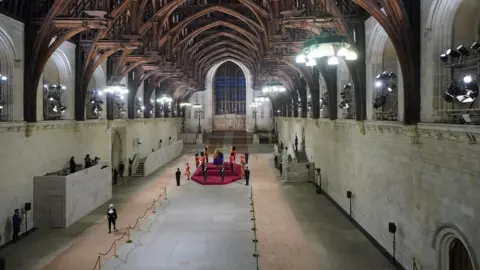Queen's funeral: I feel privileged, says final lying-in-state mourner
The last person to view Queen Elizabeth II's lying-in-state says it was "a real privilege" to pay her respects.
Chrissy Heerey, a serving member of the RAF from Melton Mowbray, said it was "one of the highlights of my life".
Hundreds of thousands of people queued to file past the Queen's coffin, with the final mourners leaving just after 06:30 BST.
At 10:44 the coffin was taken in a procession to nearby Westminster Abbey for the state funeral.
The doors of the Abbey opened for guests to start arriving at 08:00, ahead of the service, which started at 11:00.
The lying-in-state lasted for four-and-a-half days.
The queue closed shortly after 22:40 on Sunday but anyone already waiting with a wristband was assured they would be admitted.
At its peak, people were waiting for more than 24 hours in a long line that snaked through central London for almost seven miles (11.2km), ending in a three-mile zigzag in Southwark Park.
 PA Media
PA MediaMs Heerey, who was viewing the lying-in-state for the second time, told BBC Radio 5 Live it felt "very surreal".
"I couldn't believe I was there," she said. "I just felt very honoured that I had the opportunity to be able to go in there and see her and say my farewell."
Sima Mansouri, the second last person to see the lying-in-state, said that she thought she and Ms Heerey would be "friends for ever" after bonding in the queue.
"Everybody just wanted to come together and be happy and peaceful and talk about memories," said Ms Mansouri, who is originally from Iran but lives in Croydon, south London.
"[Chrissy] was a little nervous, being the last person, but I said, 'Don't worry. I've got your back. I'm here'."
Mother and daughter Christine and Sarah Rogers, who had travelled from Woodbridge in Suffolk, were the final two people to be handed wristbands to join the queue.
The crowds behind them burst into applause as they were told they would be the last people allowed to enter Westminster Hall.
Sarah said: "It means a lot to come and pay our respects, because she's been a constant in my life. To just go there and say thank you… it means a lot."
As the lying-in-state drew to a close on Monday morning, members of parliamentary staff followed the final mourners, with Black Rod Sarah Clarke, a senior officer in the House of Lords, being the last to walk past the coffin.
 PA Media
PA MediaEarlier, several hundred people were turned away from the queue, including Vidur and Natasha Pabari, from Chigwell.
Vidur said it was "heartbreaking" to miss out, while Natasha said: "We will have to pay our respects another way."

In the hall, salutes and tears

Over the past four-and-a-half days, Westminster Hall has been a steady stream of silent tribute.
From members of the public to foreign leaders, huge numbers have made their way through the historic hall, pausing in front of the monarch's coffin, draped in the royal standard and topped by the imperial crown.
We stood at the back of the hall as the final visitors streamed through just before 06:30 this morning.
Some paused briefly to bow their heads. Others shed a tear. One man, wearing full army fatigues, saluted the coffin.
The last person to walk through the hall was Black Rod - the senior official from the House of Lords. She stopped, bowed briefly, before bringing the lying-in-state to an official end.

On Sunday, organisers urged people not to travel to the queue to avoid disappointment in case they missed the cut-off time.
The number of people to view the Queen's lying-in-state is yet to be announced.
About 2,000 people are expected to have attended the state funeral at Westminster Abbey, including 500 presidents, prime ministers, and foreign royals from around the world.
King Charles walked behind his mother's coffin in a procession from the Palace of Westminster, alongside the monarch's other children, the Princess Royal, the Duke of York and Earl of Wessex.
Behind them was the Queen's grandsons, the Prince of Wales, the Duke of Sussex and Peter Phillips. Prince George and Princess Charlotte also attended the Queen's funeral.




